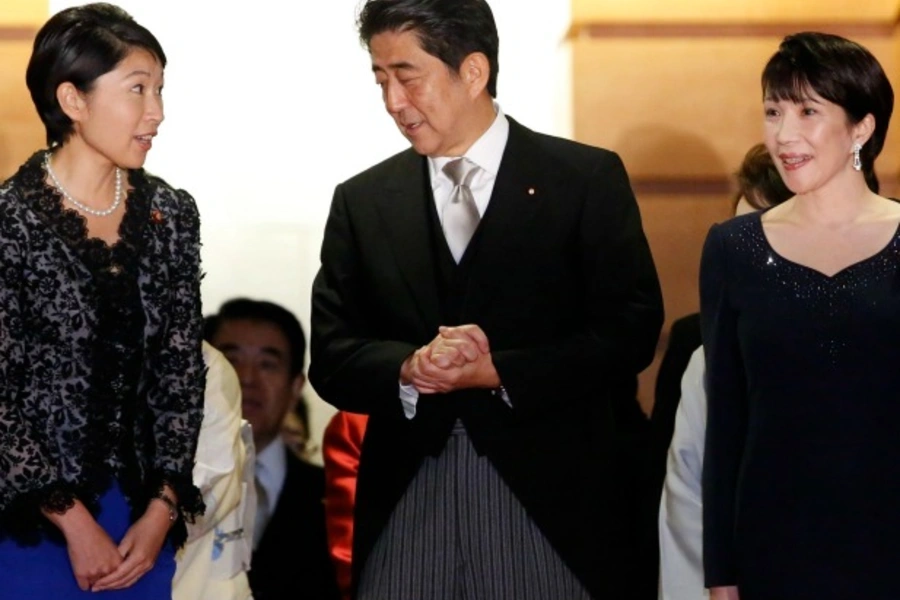Friday Asia Update: Top Five Stories for the Week of September 5, 2014

More on:
Ashlyn Anderson, Lauren Dickey, Darcie Draudt, Andrew Hill, Will Piekos, and Sharone Tobias look at the top stories in Asia today.
1. Japan reshuffles Cabinet. Japanese prime minister Shinzo Abe reshuffled his inner circle on Wednesday, the first such move since he returned to office nearly two years ago. While key members of the previous cabinet, including Chief Cabinet Secretary Yoshihide Suga, retained their posts, notable new appointments include a new minister of defense and a newly created post of security legislation minister, as well as five new female ministers. Overall, the move seems to have some popularity with voters, who gave the new cabinet 54.9 percent and 64 percent approval ratings in polls conducted by Kyodo News and the Yomiuri Shimbun, respectively. The reshuffle seems especially favorable to female voters, with 63 percent of female respondents in the Yomiuri’s poll having a positive view of the new cabinet, representing an impressive 18 percent jump over the previous incarnation.
2. Beijing reasserts its grip on Hong Kong elections. The Standing Committee of China’s National People’s Congress issued restrictive guidelines this week for the election of Hong Kong’s next chief executive in 2017. While selection of the chief executive will shift from a 1,200-member election committee to popular vote, all presumptive nominees must first be unanimously endorsed by the committee and approved by the Chinese government, ensuring Hong Kong’s leader will meet Beijing’s approval. Critics have called Beijing’s new regulations a “fake democracy” that only gives residents an illusion of choice. Others, including the British government, “welcome” the proposal.
3. Al-Qaeda establishes fifth official branch in India. In a video released this week, al-Qaeda leader Ayman al-Zawahri announced the beginning of a new branch of the terrorist group on the Indian subcontinent. The establishment of the branch, Qaedat al-Jihad, represents al-Qaeda’s efforts to increase support among India’s 170 million Muslims, as well as Muslims in Myanmar and Bangladesh. In the video, Zawahri calls for Muslims to rally for the formation of a caliphate, asserting that the subcontinent was previously Muslim territory before the “infidel army” occupied it. Al-Qaeda is also facing intense competition for support with the Islamic State of Iraq and Syria (ISIS), which has already succeeded in recruiting a number of Indian Muslims to its cause.
4. Australia and India agree to uranium export deal. During a state visit to New Delhi, Australian prime minister Tony Abbott signed an agreement with his Indian counterpart, Narendra Modi, to allow for the export of Australian uranium to India for power generation. The deal is an appropriate marriage of interests: Australia holds over a third of uranium reserves, while India faces chronic power shortages and depends on fossil fuels for 65 percent of its power. However, some critics of the deal are concerned that the uranium could end up in nuclear weapons, as India is not a signatory of the Nuclear Non-proliferation Treaty; Abbott countered that, “India has an absolutely impeccable non-proliferation record… and India has been a model international citizen.”
5. South Korea and United States announce plans to organize combined wartime division. The division would activate during wartime and provide services such as civilian affairs operations in North Korea and seeking and removing nuclear weapons materials. During peacetime, the troops from each country will train together but live at separate bases. It will first be located in Uijeongbu, north of Seoul, until U.S Forces Korea headquarters move to Pyeongtaek in 2016, part of a long-planned relocation of U.S. forces to locations south of the Han River. The commander of the U.S. Second Infantry Division will lead the new combined division, with a South Korean brigadier general serving as deputy.
Bonus: Malaysia Airlines scraps unfortunate “bucket list” ad campaign. Malaysia Airlines launched a promotion asking travelers which places were on their “bucket list”—apparently not realizing that the phrase implies making a list of things to do before you die. Malaysia Airlines is still suffering from negative perceptions after the disappearance of flight MH370 from Kuala Lumpur to Beijing in March and a missile brought down flight MH17 while flying over Ukraine in July. The contest was renamed “Win an iPad or Malaysia Airlines flight to Malaysia.”
More on:
 Online Store
Online Store